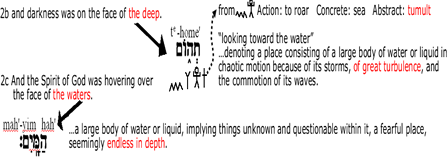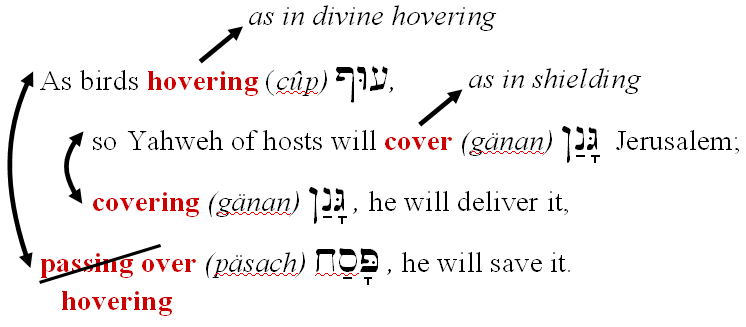The Friendly Fire Room Presents
Listen And See
Thank you Wanda Barlow for this great idea!
Genesis Framework Part 4
Genesis Framework Pt 4
To God be the Glory, great things He has done.
mcmtffr.org wishes to acknowledge and thank Derek Konofalski and Rocket Media for making this page:
Mobile Friendly
Genesis Framework
GF 04 Genesis 1.2
July 19, 2015
Part 4
Scripture
Genesis 1.2
NKJ Genesis 1:1-2
In the beginning
God created the heavens and the earth.
2 (a) The earth was without form, and void;
(b) and darkness was on the face of the deep.
(c) And the Spirit of God was hovering over
the face of the waters.
NKJ Genesis 1:1-2
In the beginning
God created the heavens and the earth.
2 (a) The earth was without form, and void; (b) and darkness was on the face of the deep.
(c) And the Spirit of God was hovering over
the face of the waters.

NKJ Genesis 1:1-2
In the beginning
God created the heavens and the earth.
2 (a) The earth was without form, and void;
(b) and darkness was on the face of the deep.
(c) And the Spirit of God was hovering over
the face of the waters.

NKJ Exodus 10:21
Then the LORD said to Moses, "Stretch out your hand toward heaven,
that there may be darkness over the land of Egypt,
darkness which may even be felt.
…and darkness shall become over the land of Egypt a darkness (noun subject) causing feeling (groping). Hiphil verb (causative active), that will cause one to feel, i.e., grope as a blind man
KJVJeremiah 4:23
I beheld the earth, and indeed it was without form,[![]() ] and void;
[
] and void;
[![]() ] And the heavens, they had no light. ie total darkness
] And the heavens, they had no light. ie total darkness
NKJ Genesis 1:1-2
In the beginning
God created the heavens and the earth.
2 (a) The earth was without form, and void;
(b) and darkness was on the face of the deep.
(c) And the Spirit of God was hovering over
the face of the waters.


2c And the Spirit of God was hovering over the face of the waters. When Genesis 2c likens the Creator-Spirit to a bird hovering by actively fluttering over the deep-and-darkness, is this image intended as a figure, a metaphor representation?
Actually, this “avian” image is an extremely important key figure used throughout the entirety of the Scriptures, from Genesis through Revelation.
This image is so important that it is difficult to overstate
its revelatory significance! The Creator-Spirit image recurs in the Bible with
surprising frequency, as Glory-cloud theophanies,
the Glory-Presence, Angel figures, a Descending-Dove,
Tongues-of-Fire, Smoke and Fire Clouds, the Glory in
the Holy of Holies, and other forms of Divine-Glory
which all function to symbolize the Presence of God at
specific places as well as places which are
portals(( gates( doorways)) to Heaven.
While it would take us too long to locate and discuss each and every instance of the avian image in the Scriptures, we can at least examine a few of the most informative ones.
We are not suddenly going to abandon what we began today at Genesis 1.2; but we are going to take a slightly different tact, by advancing into some of the historic realities of instances of this Glory theophany in the Bible to discover how God functions with regard to this imagery, we then will return to Genesis 1.2 better informed to interpret it more fully.
As I just alluded, this same avian image is a key feature
in the Exodus 12 account of what has been called the Passover event. The extensive exegetical work of Meredith Kline has led
him to the discovery that the true identity of this Pascal
figure, with which we are all familiar, has remained
hidden behind the mistranslation of the critical verb
pasach and that the meaning of this word is not “pass over”, but actually is “hover over”!
What we’re looking for is the true nature of the event
called the “Passover” as it relates to the avian image. For a little familiar background on the use of avian
imagery for God, let’s look in Exodus.
NKJ Exodus 19:4
You have seen what I did to the Egyptians,
and how I bore you on eagles' wings
and brought you to Myself.
Perhaps you have never thought of the Exodus event as an air-lift mission, but God does. The Lord describes His guidance of Israel by the Glory-cloud in this manner of figure.
Moses, in fact, used this same figure of the eagle and its young when reviewing these same historical realities of the Exodus, in Deuteronomy 32.
Deuteronomy 32:10-11
He found him in a desert land
And in the wasteland, a howling wilderness;
He encircled him, He instructed him,
He kept him as the apple of His eye.
11 As an eagle stirs up its nest, Hovers over its young,
Spreading out its wings, taking them up,
Carrying them on its wings,
Moses’ reference is obviously to God’s shepherding of Israel through the wilderness by the theophanic cloud depicted in the same distinctive figurative language of Genesis 1.2; that is, as a birdlike hovering (fluttering) over the unstructured world tohu.
Bear this in mind as we continue; although in the Exodus,
the Glory theophany was a cloud formation, clouds and birds belong to the same sphere of the sky, both fly across
it. When angels appear, they also share the celestial realm
of clouds and birds, as they too are said to fly. So, in
symbolic representation angelic beings are winged.
For example…
Isaiah 6:6
Then one of the seraphim flew to me,
having in his hand a live coal which he had taken with the tongs from the altar.
Daniel 9:21
yes, while I was speaking in prayer, the man Gabriel,
whom I had seen in the vision at the beginning, being
caused to fly swiftly, reached me about the time of the
evening offering.
More…
Revelation 14:6
Then I saw another angel flying in the midst of heaven,
having the everlasting gospel to preach to those
who dwell on the earth –
to every nation, tribe, tongue, and people --
So, in symbolic representation angelic beings are winged. The most relevant here are the figures of the cherubim
guardians of the Glory-Presence in the Holy of Holies
and the hosts of winged heavenly creatures seen attending
the divine Glory in visionary revelations in Isaiah and Ezekiel…
Isaiah 6:2
Above it stood seraphim; each one had six wings:
with two he covered his face,
with two he covered his feet, and with two he flew.
Ezekiel 3:13
I also heard the noise of the wings of the
living creatures that touched one another, and the noise
of the wheels beside them, and a great thunderous noise.
Ezekiel 10:4
Then the glory of the LORD went up from the cherub, and paused over the threshold of the temple;
and the house was filled with the cloud, and the court
was full of the brightness of the LORD's glory.
Ezekiel 11:22
So the cherubim lifted up their wings,
with the wheels beside them, and the glory
of the God of Israel was high above them.
It is the Glory-cloud theophany that has such an affinity relationship with the avian imagery in the Bible, and Isaiah certainly parallels the cloud, covering, angels, birds, flight, and hovering imagery:
Isaiah 60:8
Who are these who fly like a cloud,
And like doves to their roosts?
Notice that both birds and clouds provide protective overshadowing by their outspread wings and covering.
One of the most relevant examples are the figure of the cherubim guardians of the Glory-Presence in the Holy of Holies and the host of winged heavenly creatures we read of in the Book of Revelation.
Now, let’s get back to the Passover investigation.
In the current popular understanding of the Exodus 12
event (which may have first appeared in the Vulgate),
there are two Hebrew verbs denoting totally different
actions, the meaning of both which are being expressed
as “pass over.”
Late 4th century
![]() translated: "Pass over " action denoted: totally acceptable
translated: "Pass over " action denoted: totally acceptable
![]() translated "Pass over" action denoted: not acceptable
translated "Pass over" action denoted: not acceptable
pasach
NKJ Exodus 12:12
For I will pass through![]() the land of Egypt on that
night, and will strike all the firstborn in the land of Egypt,
both man and beast; and against all the gods of Egypt
I will execute judgment: I am the LORD.
the land of Egypt on that
night, and will strike all the firstborn in the land of Egypt,
both man and beast; and against all the gods of Egypt
I will execute judgment: I am the LORD.
![]() verb: to pass through, to traverse -- of presence, in the midst of a multitude, among.
verb: to pass through, to traverse -- of presence, in the midst of a multitude, among.
NKJ Exodus 12:13
Now the blood shall be a sign for you on the houses
where you are. And when I see the blood, I will pass over you ![]() ; and the plague shall not
be on you to destroy you when I strike the land of Egypt.
; and the plague shall not
be on you to destroy you when I strike the land of Egypt.
I ![]() verb: to pass or spring over --
verb: to pass or spring over --
II ![]() verb: to limp -- Not a remote second meaning
verb: to limp -- Not a remote second meaning
Please read these verses carefully…
NKJ Exodus 12:12
For I will pass through ![]() the land of Egypt on that
night, and will strike all the firstborn in the land of Egypt,
both man and beast; and against all the gods of Egypt
the land of Egypt on that
night, and will strike all the firstborn in the land of Egypt,
both man and beast; and against all the gods of Egypt
I will execute judgment: I am the LORD.
NKJ Exodus 12:13
Now the blood shall be a sign for you on the houses
where you are. And when I see the blood,
I will pass over you ![]() ; and the plague shall not
be on you to destroy you when I strike the land of Egypt.
; and the plague shall not
be on you to destroy you when I strike the land of Egypt.
I will pass through ![]() the land of Egypt
the land of Egypt
I will strike all the firstborn
I will execute judgment
when I see the blood, I will pass over ![]() you
you
and the plague shall not be on you to destroy you when I strike the land of Egypt.
(Q) How many subject actors are there
in these two verses?
One Correct
Now see what else Moses said.....
NKJ Exodus 12:23
For the LORD (Yahweh) will pass through ![]() to strike the Egyptians;
and when He sees the blood on the lintel
and on the two doorposts,
the LORD (Yahweh) will pass over
to strike the Egyptians;
and when He sees the blood on the lintel
and on the two doorposts,
the LORD (Yahweh) will pass over ![]() the door
and not allow the destroyer to come into your houses to strike you.
the door
and not allow the destroyer to come into your houses to strike you.
(Q) How many subject actors are there
in this verse?
Two Correct
THINK!

NKJ Exodus 12:23
For the LORD (Yahweh) will pass through ![]() to strike the Egyptians;
and when He sees the blood on the lintel
and on the two doorposts,
the LORD (Yahweh) will pass over
to strike the Egyptians;
and when He sees the blood on the lintel
and on the two doorposts,
the LORD (Yahweh) will pass over ![]() the door
and not allow the destroyer to come into your houses to strike you.
the door
and not allow the destroyer to come into your houses to strike you.
(Q) How many subject actors are there
in this verse?
Two Correct
THINK!

Do you notice some difficulty with equating the destroyer, who “passes through” the land, with the one who “passes over” the Israelite houses? Earlier in Exodus 12, the Lord God is referred to as the subject of the destructive passing through Egypt, either in terms of His being the ultimate author of this judgment or in terms of the divine identity of the destroyer angel.
Stay with me…
Also notice that Exodus 12.23 makes an obvious
distinction between Yahweh as the one who performs the pasach-act, and the destroyer as the one who strikes the
first-born to death. “…the LORD (Yahweh) will pass over ![]() the door
and not allow the destroyer to come into your houses to strike you.”
the door
and not allow the destroyer to come into your houses to strike you.”
This doesn’t make sense!
So, whatever is the precise meaning of the pasach-act, it is Yahweh who does it, and not the destroyer; and the purpose of the pasach-act is for Yahweh to deny the destroyer access through each blood-marked entryway; but not by passing over it.
Again, whatever is the precise meaning of the pasach-act,
it is Yahweh who does it, and it is a distinctly a different
action from that of the destroyer who passes over (through)
the land in judgment.
This translation problem is also evidence of a meaning of pasach which is other than “pass over,” a meaning that fits what this contextual imagery demands, such as a shielding action; not a hopping over, a detour, a distancing of God from the house, but an abiding Presence, a divine encamping like a guardian at the gate.
True exegesis does permit the practice of making up
a word to fit a particular context to solve translation
problems. The exegete must apply the principle that Scripture
interprets Scripture. That requires an investigation of the Scriptures to find
the closest analogy of context as can be found in order to
make an informed comparison.
Kline says that this means that there must have been,
not another meaning for the root , ![]() but another
root
but another
root ![]() that denotes a far more appropriate image
for the Exodus 12 context.
that denotes a far more appropriate image
for the Exodus 12 context.
Where do we go to find a second root that meets the contextual demands of Exodus 12?
Meredith Kline shows us that a second root ![]() is
clearly attested to in Isaiah 31.5, and I agree.
is
clearly attested to in Isaiah 31.5, and I agree.
Let me explain…
The indications in Isaiah 31:5 are that pasach denotes, more specifically, a sheltering action.
As birds hovering (cûp) ![]() so Yahweh of hosts will cover (gänan)
so Yahweh of hosts will cover (gänan) ![]() " Jerusalem;
covering (gänan),
" Jerusalem;
covering (gänan),![]() he will deliver it, hovering (päsach)
he will deliver it, hovering (päsach) ![]() , he will save it.
, he will save it.
Now let’s look at this in proper perspective…
The form is a chiasm from the Greek letter X

Isaiah 31.5 yields something more than evidence of a root pasach meaning “cover/hover over,” because it actually
seems to directly allude to the original paschal event of
Exodus 12.
The context is itself irony.
Israel was looking to Egypt for help against the Assyrians, and not to the Lord! Ironically, Israel looked to Egypt, house of bondage from which the Lord had back in the day redeemed them. Notice the same the same avian perspective as in the judicial passage over Egypt in the tenth plague: God descends from heaven and alights on Zion, encamping over the city for warfare against the attacker. The divine hovering mentioned in v. 5 would thus provide an explanation of God's pasach-action in the paschal episode of Exodus 12, interpreting it as a birdlike shielding of His threatened people.
NKJ Isaiah 31:1-3
Woe to those who go down to Egypt for help,
And rely on horses,
Who trust in chariots because they are many,
And in horsemen because they are very strong,
But who do not look to the Holy One of Israel,
Nor seek the LORD!
2 Yet He also is wise and will bring disaster,
And will not call back His words,
But will arise against the house of evildoers,
And against the help of those who work iniquity.
3 Now the Egyptians are men, and not God;
And their horses are flesh, and not spirit.
When the LORD stretches out His hand,
Both he who helps will fall,
And he who is helped will fall down;
They all will perish together.
Isaiah 31:4-5
4 For thus the LORD has spoken to me: "As a lion roars,
And a young lion over his prey (When a multitude of
shepherds is summoned against him,
He will not be afraid of their voice
Nor be disturbed by their noise),
So the LORD of hosts will come down
To fight for Mount Zion and for its hill.

Apply this to Exodus 12…
NKJ Exodus 12:12
For I will pass through ![]() the land of Egypt on that
night, and will strike all the firstborn in the land of Egypt,
both man and beast; and against all the gods of Egypt
I will execute judgment: I am the LORD.
the land of Egypt on that
night, and will strike all the firstborn in the land of Egypt,
both man and beast; and against all the gods of Egypt
I will execute judgment: I am the LORD.
NKJ Exodus 12:13
Now the blood shall be a sign for you on the houses
where you are. And when I see the blood, I will hover over you ![]() ; and the plague shall not
be on you to destroy you when I strike the land of Egypt.
; and the plague shall not
be on you to destroy you when I strike the land of Egypt.
And, finally…
NKJ Genesis 1:1-2
In the beginning
God created the heavens and the earth.
2 (a) The earth was without form, and void;
(b) and darkness was on the face of the deep.
(c) And the Spirit of God was hovering over
the face of the waters.
Now may God bless this teaching and descend upon you from heaven, bringing the protective and illuminating power of His Glorious Presence, to reveal the truth of His Word unto you through God the Holy Spirit working in you what is well pleasing in His sight, in Jesus’ name.
Amen